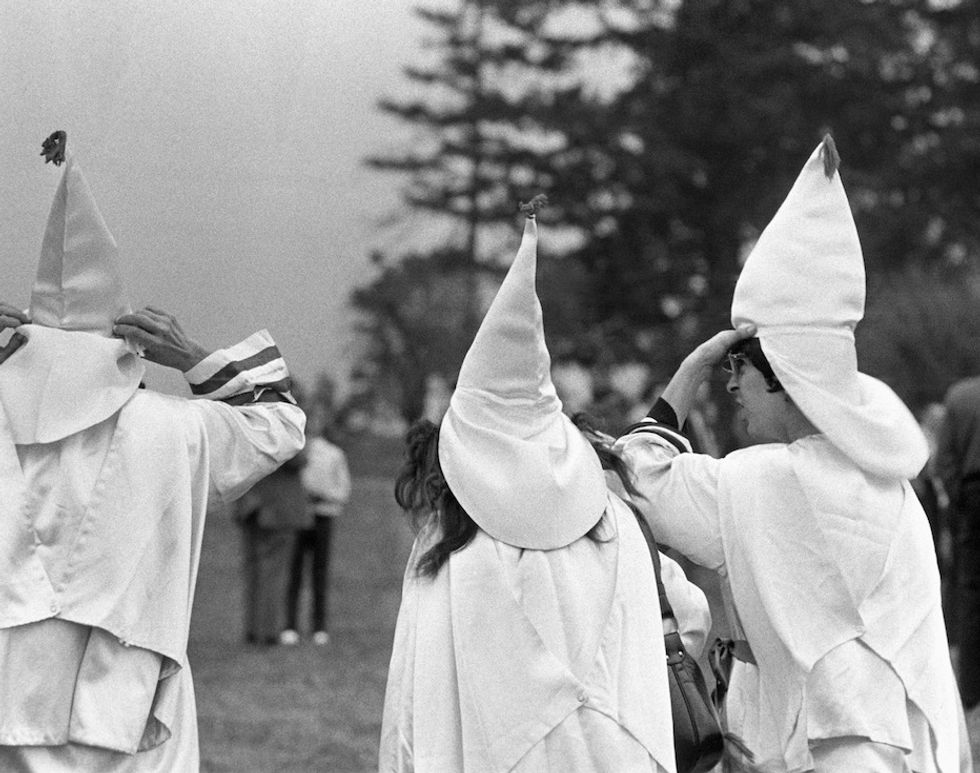
Robed Klansman. (AP Photo)

Dinesh D’Souza’s new documentary “Hillary's America: The Secret History of the Democratic Party” looks at the buried past of the Democratic party. Much of that past is also featured in the new book, Tainted by Suspicion: The Secret Deals and Electoral Chaos of Disputed Presidential Elections (Stairway Press, 2016) by Fred Lucas. The following excerpts look at that history seldom talked about today, from the establishment of the big government machine politics, to the rise of a notorious hate group.
 The Ku Klux Klan burns a huge cross atop Stone Mountain, near Atlanta, Ga. on July 23, 1948, while initiating 700 new members. (AP Photo)
The Ku Klux Klan burns a huge cross atop Stone Mountain, near Atlanta, Ga. on July 23, 1948, while initiating 700 new members. (AP Photo)
If Andrew Jackson had Won the 1824 Election:
After the 1824 campaign, what remained of Thomas Jefferson’s Democratic-Republican party divided into the Jacksonian Democrats and the Adams-Clay National Republicans. The National Republicans went the way of the Federalists before the 1836 election, replaced by the Whigs.
Though Democrats celebrate Jefferson/Jackson Dinners, it’s Jackson—with the help of Martin Van Buren and other top political operatives among his staunch supporters—that started what is today the Democratic party.
Paul Haynie, professor of history at Harding University in Arkansas, said: "Had Jackson won in 1824, you never would have had the modern Democratic Party. That would have meant a massive shift in politics. The Democratic-Republicans Party might have been able to maintain party unity, or reunite its factions for a while after the 1824 election. But somewhere down the line, there would have been a break."
That change could be cosmetic. There indeed would have been some party to emerge that stuck with a Jacksonian view or at least rhetoric of championing the common man. Such rhetoric would have produced a tendency to veer toward the populist and progressive movements of later generations. It might not have been called the Democratic Party.
Larry Schweikart is a professor of history at the University of Dayton and the author of "Seven Events That Made America America," where he wrote about the Democratic party’s creation.
Schweikart wrote: "The aftermath of 1824 was significant because Martin Van Buren used the time between then to create the Democratic Party with the spoils system, the patronage, bribes and rewards to make sure people turn out for Andrew Jackson in 1828."
"It was in fact the Jackson presidency, along with the political machinery established by Van Buren that created the framework for big government," Schweikart continued. "The spoils system causes government to grow. With every election one candidate promises more government jobs and the other candidate feels he has to promise more.”
Jackson’s popular sovereignty was based largely on giving the masses what they want, which fit well with the spoils system. Though he isn’t often associated with big government, under Jackson, the federal workforce expanded significantly. One anecdote demonstrating this was Jackson friend and political operative William Lewis. So grateful for his friend’s help for orchestrating his political successes, Jackson first offered Lewis a cabinet position of his choosing. Lewis turned him down. Lewis said he would prefer a well-paying government job that required no work. Jackson appointed him as a Treasury Department auditor.
However, Adam Carrington, a professor of Politics at Hillsdale College, contends it might not be entirely fair to blame big government on Jackson.
"If a progressive is to be defined as amassing power into the executive branch, then Jackson would be a progressive, but so much of the progressive movement was an overreaction to the spoils system," Carrington said. "The spoils system was replaced with a bureaucracy of permanent civil servants that took government out of the people’s hands. At least in a spoils system, voters could keep a corrupt system in check. Jackson had excesses. But he vetoed the national bank and national improvements. He thwarted the expansion of big government.”
Democrats and the Klan
Despite laws being enforced, the Ku Klux Klan still carried out acts of violence on election day in order to try to ensure a Democratic victory.
There were three Reconstruction amendments to the Constitution: The Thirteenth that abolished slavery; the Fourteenth providing equal protection under the law and the Fifteenth, regarding voting. Each created angst among stubborn southerners.
It was the Fifteenth Amendment, ratified in 1870, that created the controversy that ensued around the 1876 election.
The Ku Klux Klan, which Columbia University historian Eric Foner called, “a military force serving the interests of the Democratic Party,” and University of North Carolina historian Allen Trelease called the “terrorist arm of the Democratic Party,” had already been carrying out violence throughout the South against blacks and the carpetbagger Republican governments installed through military occupation directly after the Civil War.
To reinforce the intimidation tactics, the Klan would hold public burnings of Republican ballots in southern states. The result in several elections was that turnout in the Union strongholds of many southern states dropped dramatically.
After the passage of the Fifteenth Amendment, the Ku Klux Klan swept in to prevent blacks from voting. This forced President Ulysses S. Grant to push bills through a sometimes reluctant Congress, including what became known as the Ku Klux Klan Act, that would require federal supervision of election. The Ku Klux Klan Act made it a crime to conspire to prevent people from voting, holding office or having other basic equal protections of the law. Grant signed it in April 1871, and the bill succeeded in at least reducing Klan violence, though not stopping it.
Fred Lucas, a veteran political reporter, is the author of Tainted by Suspicion: The Secret Deals and Electoral Electoral Chaos of Disputed Presidential Elections.
–
TheBlaze contributor channel supports an open discourse on a range of views. The opinions expressed in this channel are solely those of each individual author.